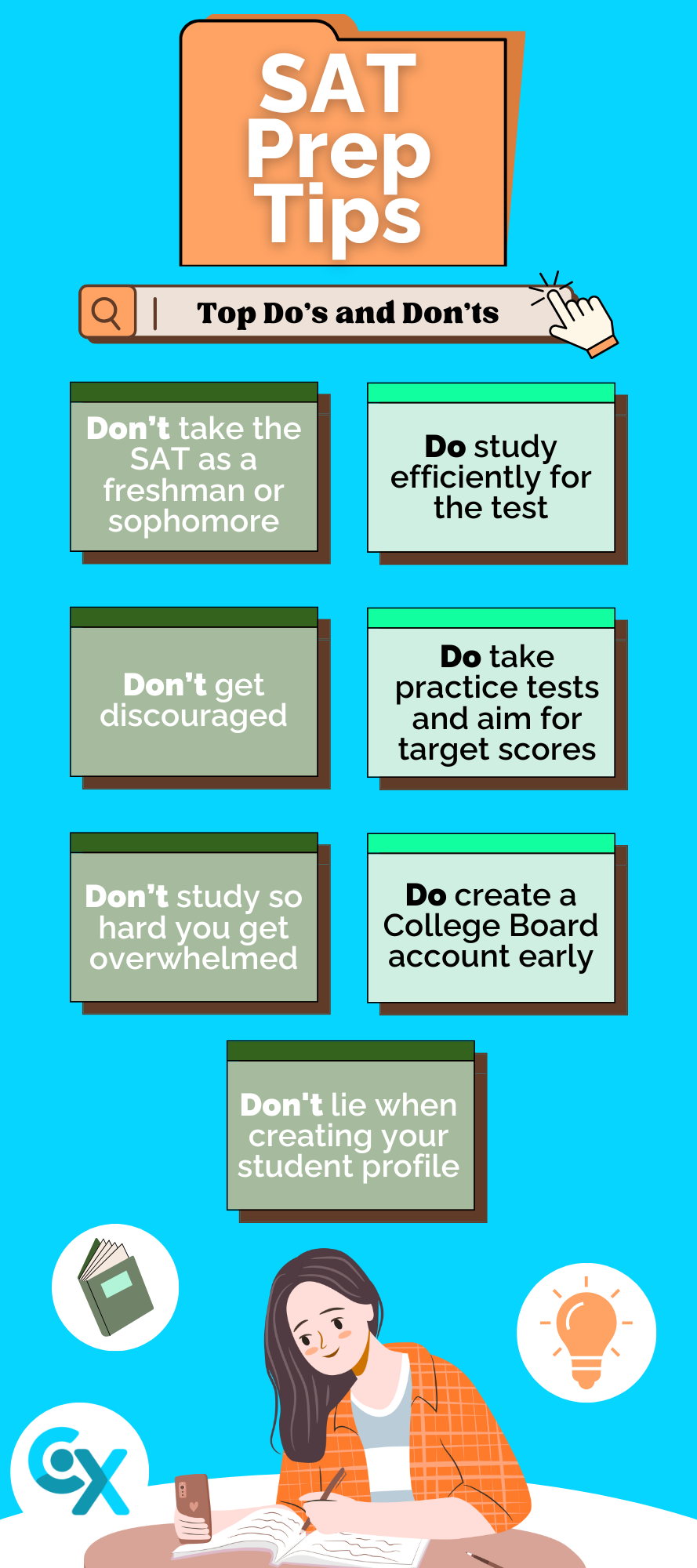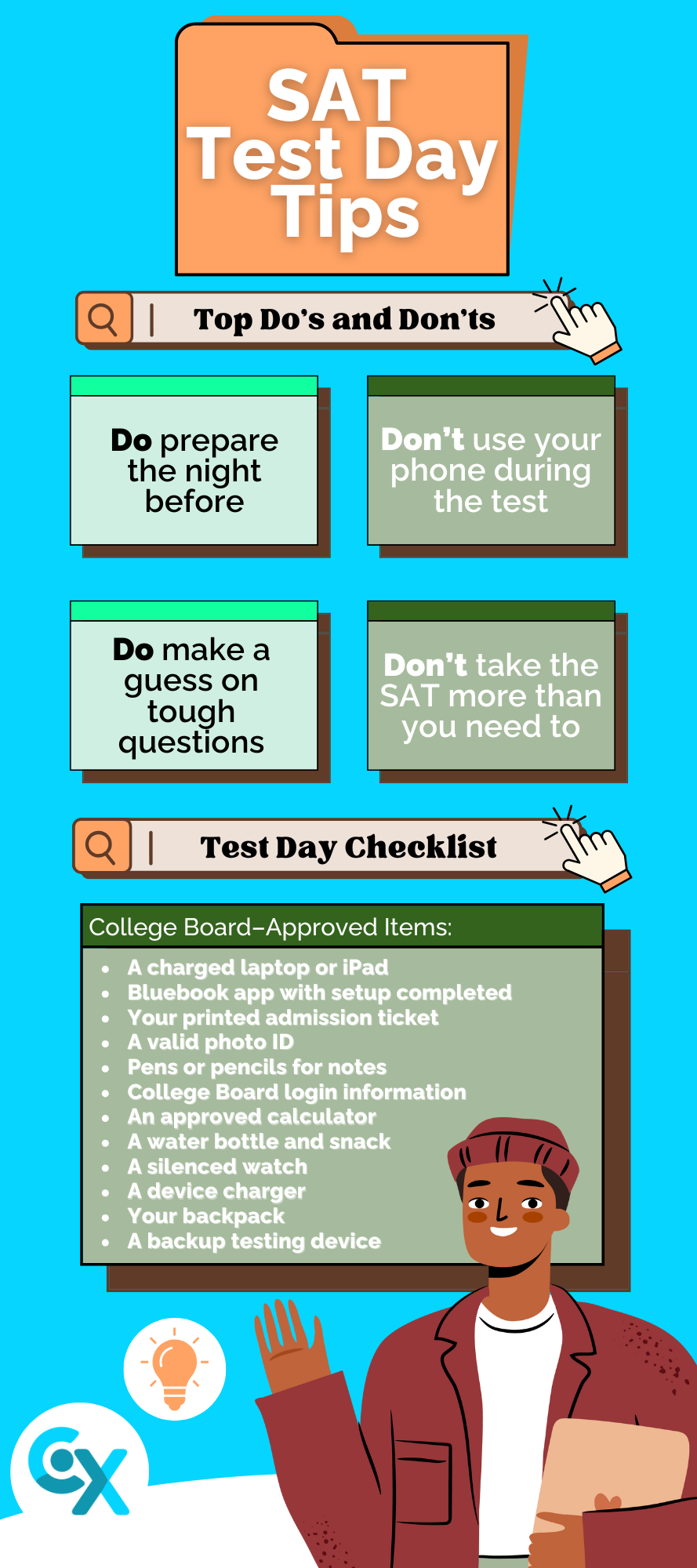Taking the SAT can be overwhelming, even for the most prepared of students and even for those who have taken it before. But admittedly, taking the SAT can cause a lot more stress if you’re unprepared. The best thing you can do for yourself is to stress less by following this crucial advice from students who have been there.
Top do’s and don’ts for SAT test prep
SAT prep starts long before you sit down on test day and take the exam. Here are a few do’s and don’ts to keep in mind to help with your studying. 
Don’t take the SAT as a freshman or sophomore
Unless you have some extenuating circumstances that require you to take the SAT early, you shouldn’t take it before your junior year. You most likely won’t have the math skills necessary for the test, which will bring down your score. Freshman and sophomore years should be when you focus on doing well in classes and getting involved in clubs, sports, volunteering, or a job. The last thing you want on your college application is SAT scores from sophomore year and no extracurriculars.
Related: 6 Quick and Essential Tips to Prepare for the PSAT
Do study efficiently for the test
You know your own strengths and weaknesses, so when junior year is approaching, study for what you know will be most difficult for you. That might mean hitting the math sections—and hard. If you know there’s one math problem that always trips you up, make sure you review it thoroughly. On the other hand, if reading comprehension is something that you struggle with, do a few practice tests to help prepare.
Don’t get discouraged
You can do this! The SAT wasn’t designed to cause you immense stress. Believe it or not, it was created as a tool to help you assess your strengths and weaknesses when applying for colleges. Right now, taking and performing well on the SAT may seem like a huge obstacle that you need to overcome, but as long as you put a little work into it, everything will be fine.
Do take practice tests and aim for target scores
Having a general idea of the range of scores you’ll need to get into your dream school(s) will be a huge advantage. You can find admitted students’ average test scores by visiting a school’s website or contacting an admission office. Then you know what you aim for when you take a practice test.
Khan Academy offers free personalized SAT preparation, including essay questions if you’re taking a version of the test that still includes the essay. Taking practice tests will help you feel more confident in making good choices and not second-guess your answers that are most likely right. If you get scores in the target range of your colleges’ requirements: Perfect! If you’re not: Now you know you must study a little harder next time.
Related: How to Set Reasonable Expectations for Your SAT or ACT Scores
Don’t study so hard that you get overwhelmed
Experts say to study in small increments before the test and spend the night before relaxing or having fun. Spend the two weeks before the SAT going over your biggest struggles, but the Friday night before the test, go out with your friends. There’s no need to get super stressed about it because it's not something you can cram for the night before anyway.
Do create a College Board account early
Okay, this is technically a do and a don’t: Because don’t sign up the night before the deadline for regular registration! Do sign up at least a week before the deadline—that way, if something stops you from being able to finish signing up, you can come back to it later without worrying. Also, give yourself around 45 minutes to complete the sign-up. The last thing you want is to be rushed when entering important information and risk inputting errors.
Don't lie when creating your student profile
When you register for the SAT, you have the option of filling out a personal profile with info that can be sent to colleges. It’s not to your advantage to lie about your grades or what classes you’ve taken here. Don’t claim you play a varsity sport just because you play football at home. We all know it’s wrong, and the consequences outweigh any potential benefit.
Related: Big Changes: What to Know About the Evolving SAT
Top do’s and don’ts for the day of the test
Now that you have some essential advice for your test prep, here are some simple do’s and don’ts to make SAT day go a lot smoother. 
Do prepare the night before
The night before your test, you should make a checklist of everything you need to bring. Here’s what you’ll need according to the College Board, which administers the test:
- A charged Windows, Mac, or Chromebook laptop or iPad
- The Bluebook app installed on your device and exam setup completed
- Your printed admission ticket
- A valid photo ID (which could be a school ID if it includes your birthday)
- Pens or pencils for scratchwork
- Your College Board account login information
- A College Board–approved calculator (online calculator now included)
These are also the items that, while not crucial, might be helpful for comfort and accessibility on the day of:
- A water bottle and a snack for break time
- A silenced watch (timer also included in Bluebook app)
- A charger
- Your backpack
- A backup testing device
Preparing this list of materials the night before can prevent last-minute stress or rushing the next morning. The last thing you want is to be late. Once the doors close, you’re not getting in.
Related: What Can I Do If I’m Feeling Nervous About My SAT Test Date?
Don’t use your phone during the test
The exam proctor will collect everyone's phones before the test to ensure there’s no cheating. Don’t hide it because if you’re found with one during the exam, your scores will be canceled. When you’re told to silence your phone, actually turn it all the way off. If your phone makes a noise, your scores will be canceled. It’s also a major distraction for everyone in the room.
Do make a guess on tough questions
There’s no penalty for guessing on the SAT. If you’re running out of time and still have five questions to go, make sure you click those bubbles! The worst-case scenario is you get them wrong, which has the same effect as not guessing. Best-case scenario, you get them right and get a higher score. If you’re stuck on a difficult question, you think you may be able to figure out, you can skip it and come back. The easy questions are worth the same number of points as the hard questions. Just don’t forget to go back to it!
Don’t take the SAT more than you need to
The great thing about the SAT is that once you’ve taken it and received your scores, you can take it again if you’re not happy with the results. Knowing what you need to do better to get that score you’ve been dreaming of will be very helpful in your second round of prep
However, don’t feel the need to continue taking it over and over again just for the sake of it. Why would you want to sit in a testing room for four hours on a Saturday morning if you don’t have to? If you hit a great target score that will impress your colleges of interest, leave it be. Don’t strive for perfection—you don’t need to push yourself to exhaustion if you’ve already reached your goal.
Related: How Do Colleges Accept Scores If I Retake the SAT?
The SAT can seem frightening at first, but don’t worry yourself too much about it. As long as you start preparing early and focus on the areas you need the most work in, you’ll knock it out of the park.
If you need more help studying, be sure to check out all our tips and tricks in the Test Prep section.







